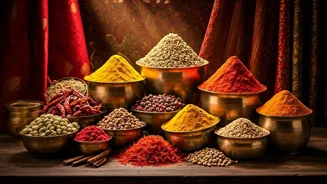Ancient Culinary Roots
Indian cuisine boasts a rich history, influenced by various cultures and trading routes. From the Indus Valley Civilization to the Mughal Empire, each
era added its unique touch. Spices like turmeric, cumin, and cardamom have always been central, offering both flavor and medicinal properties. The foundation of Indian food is rooted in tradition.
Regional Flavor Diversity
India's diverse geography gives rise to an array of culinary styles. North India offers rich, creamy curries and tandoori dishes, while South India features rice-based meals with coconut milk and lentils. East India embraces seafood and sweets, and the West showcases spicy and vibrant preparations. A culinary adventure awaits!
Key Ingredient Spotlight
Spices are the soul of Indian cuisine. Turmeric provides color and health benefits, while chili adds heat. Garam masala, a blend of spices, elevates many dishes. Lentils and rice are staples, alongside vegetables like potatoes and eggplant. Indian food's magic truly lies in the careful use of these ingredients, weaving flavor and history.
Modern Adaptations Evolve
Indian cuisine is always evolving, with chefs globally reinventing classic dishes. Fusion restaurants blend traditional techniques with modern trends. Street food, like pav bhaji, remains popular, and home cooks experiment with new recipes. From Michelin-starred restaurants to local eateries, Indian food keeps captivating.















